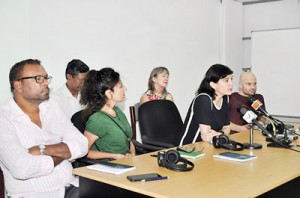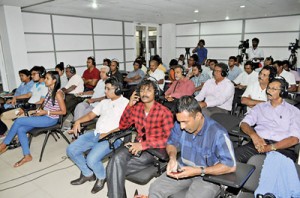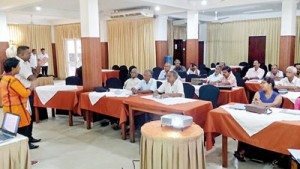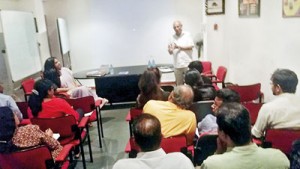News
Major campaign underway to popularise new RTI Act with public, media
View(s):The Sri Lanka Press Institute (SLPI) commenced a major campaign to popularise the newly enacted Right to Information (RTI) Act with the public and media with a series of workshops in Galle, Gampaha, Colombo and the launch of a Citizen’s Manual on the law which will come into operation on February 4, 2017.
The purpose of the RTI law is to foster a culture of transparency in public authorities by giving effect to the right of access to information and thereby promote a society in which the people of Sri Lanka would be able to more fully participate in public life through combatting corruption and promoting accountability and good governance, a release by the SLPI states.
 The SLPI conducted two pilot training workshops around the Act and the Manual it has produced in Gampaha and Galle with provincial journalists, held a workshop for Colombo based journalists at the SLPI auditorium and a lecture at the Wijeya Newspapers newsroom for journalists from Lankadeepa, Ada, Daily Mirror and the Sunday Times.
The SLPI conducted two pilot training workshops around the Act and the Manual it has produced in Gampaha and Galle with provincial journalists, held a workshop for Colombo based journalists at the SLPI auditorium and a lecture at the Wijeya Newspapers newsroom for journalists from Lankadeepa, Ada, Daily Mirror and the Sunday Times.
The Citizen’ Manual was compiled by Ms. Menaka Lecamwasam, an Attorney-at- law and is available in Sinhala, Tamil and English.
The need for a campaign on the Right to Information at the grass roots levels where ordinary people would be able to question their local government officials on transparency and accountability was highlighted during the workshop titled the ‘Role of and the Right to Information (RTI) held at the SLPI focusing on enabling local journalists understand how best to benefit from the law with examples from other countries.

Norwegian and US RTI specialists address local journalists at SLPI auditorium
A visiting Norwegian delegation of journalists briefed local journalists on Wednesday on how effectively the law can be used for news reporting and good governance. The Norwegian delegation comprised of reputed journalists and officials who held higher ranks at the Norwegian Press Institute; Kjersti Løken Stavrum, former general secretary of the Norwegian Press Institute,Thomas Frigård – journalist, member of Norway’s transparency commission, Rajan Chelliah – journalist at the Norwegian Public Service Broadcasting, Oslo branch and Eva Stabell – journalist, international officer at the Norwegian Union of Journalists.
Presenting case studies of investigative stories reported in Norwegian dailies, Thomas Frigård, a reputed journalist and a member of Norway’s transparency commission explained how he filed many RTI petitions to extract information from government which in many cases responded with blacked out documents saying it is to protect the personal information of a individual.
“No government is willing to share information with the public except selective information, I had to appeal to the board against the RTI denials and I received some positive outputs too. It’s about fighting back till the end,” he told a packed audience of journalists at the SLPI auditorium.

SLPI workshop for provincial journalists in Gampaha.
While noting that compared to the Norwegian RTI Act which consists of 34 clauses, the Sri Lankan RTI with 44 clauses is well crafted in a manner that will enable the citizens to access information effective and efficiently. The delegation also noted that the Sri Lankan RTI is ranked in the top ten best RTI laws in the world.
Dr. Jeannine E. Relly, Associate Professor, School of Journalism of the University of Arizona gave a presentation on a global perspective of RTI practiced in other countries, particularly with regard to Freedom of Information Act (FOIA), a legal mechanism that allows citizens to access information in the United States.
The visiting delegates also noted how ‘public interest’ – a term used in the Sri Lankan Act could be used to determine the release of information where public interest out-weighs an exemption in a RTI petition claim.
During the panel discussion, local journalists raised concerns over the implementation process of the recently passed RTI Act as a legal mechanism.

Dr. Wijeyananda Jayaweera, UNESCO expert explains the RTI Act to senior WNL editors

